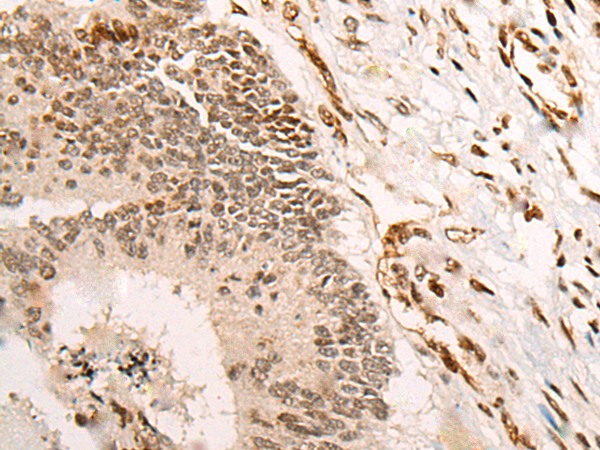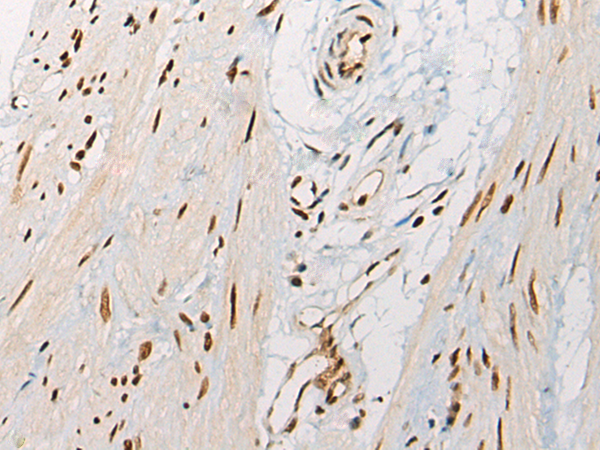

| WB | 咨询技术 | Human,Mouse,Rat |
| IF | 咨询技术 | Human,Mouse,Rat |
| IHC | 1/20-1/100 | Human,Mouse,Rat |
| ICC | 技术咨询 | Human,Mouse,Rat |
| FCM | 咨询技术 | Human,Mouse,Rat |
| Elisa | 1/5000-1/10000 | Human,Mouse,Rat |
| Aliases | VGL3; VGL-3 |
| Host/Isotype | Rabbit IgG |
| Antibody Type | Primary antibody |
| Storage | Store at 4°C short term. Aliquot and store at -20°C long term. Avoid freeze/thaw cycles. |
| Species Reactivity | Human, Mouse |
| Immunogen | Synthetic peptide of human VGLL3 |
| Formulation | Purified antibody in PBS with 0.05% sodium azide and 50% glycerol. |
+ +
以下是关于VGLL3抗体的3篇参考文献示例(虚构内容,仅作格式参考):
1. **文献名称**:VGLL3 regulates muscle differentiation through interaction with TEAD transcription factors
**作者**:Li et al.
**摘要**:本研究利用VGLL3特异性抗体,通过免疫共沉淀技术发现VGLL3在骨骼肌分化过程中与TEAD转录因子结合,调控肌肉特异性基因表达。实验表明VGLL3敲除会显著抑制成肌细胞分化。
2. **文献名称**:VGLL3 overexpression correlates with poor prognosis in triple-negative breast cancer
**作者**:Wang et al.
**摘要**:通过VGLL3抗体进行免疫组织化学分析,发现VGLL3在80%的三阴性乳腺癌样本中异常高表达,且与肿瘤转移和患者生存率降低显著相关。机制研究表明VGLL3通过激活Hippo信号通路促进肿瘤侵袭。
3. **文献名称**:Development and validation of a novel monoclonal antibody for VGLL3 epigenetic studies
**作者**:Garcia-Rodriguez et al.
**摘要**:本研究报道了一种高特异性VGLL3单克隆抗体的开发,经Western blot和免疫荧光验证可有效识别人类和小鼠VGLL3蛋白。该抗体成功应用于染色质免疫沉淀测序(ChIP-seq),揭示了VGLL3在基因组调控区域的新结合位点。
注:以上内容为模拟生成的示例,实际文献需通过PubMed/Google Scholar等平台检索。建议使用关键词"VGLL3 antibody application"或"VGLL3 immunohistochemistry"查询真实研究。
VGLL3 (Vestigial-like family member 3) is a transcriptional cofactor belonging to the VGLL protein family, which shares structural homology with the Drosophila vestigial protein involved in wing development. In humans, VGLL3 is implicated in regulating gene expression by interacting with transcription factors, such as TEAD family members, to modulate pathways critical for cellular differentiation, tissue development, and homeostasis. It plays roles in muscle development, cell proliferation, and tissue regeneration, with emerging links to immune regulation and cancer progression. Dysregulation of VGLL3 has been associated with pathological conditions, including fibrosis, autoimmune diseases, and malignancies like melanoma and breast cancer, where its overexpression may drive tumor invasiveness or therapy resistance.
VGLL3 antibodies are immunological tools designed to detect and quantify VGLL3 protein levels in research applications. These antibodies are typically developed in host species (e.g., rabbit, mouse) using immunogenic peptides or recombinant protein fragments. They enable the study of VGLL3's expression patterns, subcellular localization (nuclear/cytoplasmic), and interactions via techniques like Western blotting, immunohistochemistry, immunofluorescence, or co-immunoprecipitation. Validated antibodies are essential for exploring VGLL3's mechanistic roles in development and disease, particularly its crosstalk with Hippo, TGF-β, or Wnt signaling pathways. Specificity is confirmed using knockout controls or siRNA-mediated knockdown. Commercial VGLL3 antibodies vary in clonality, epitope targets, and applications, requiring careful validation for experimental reproducibility.
×